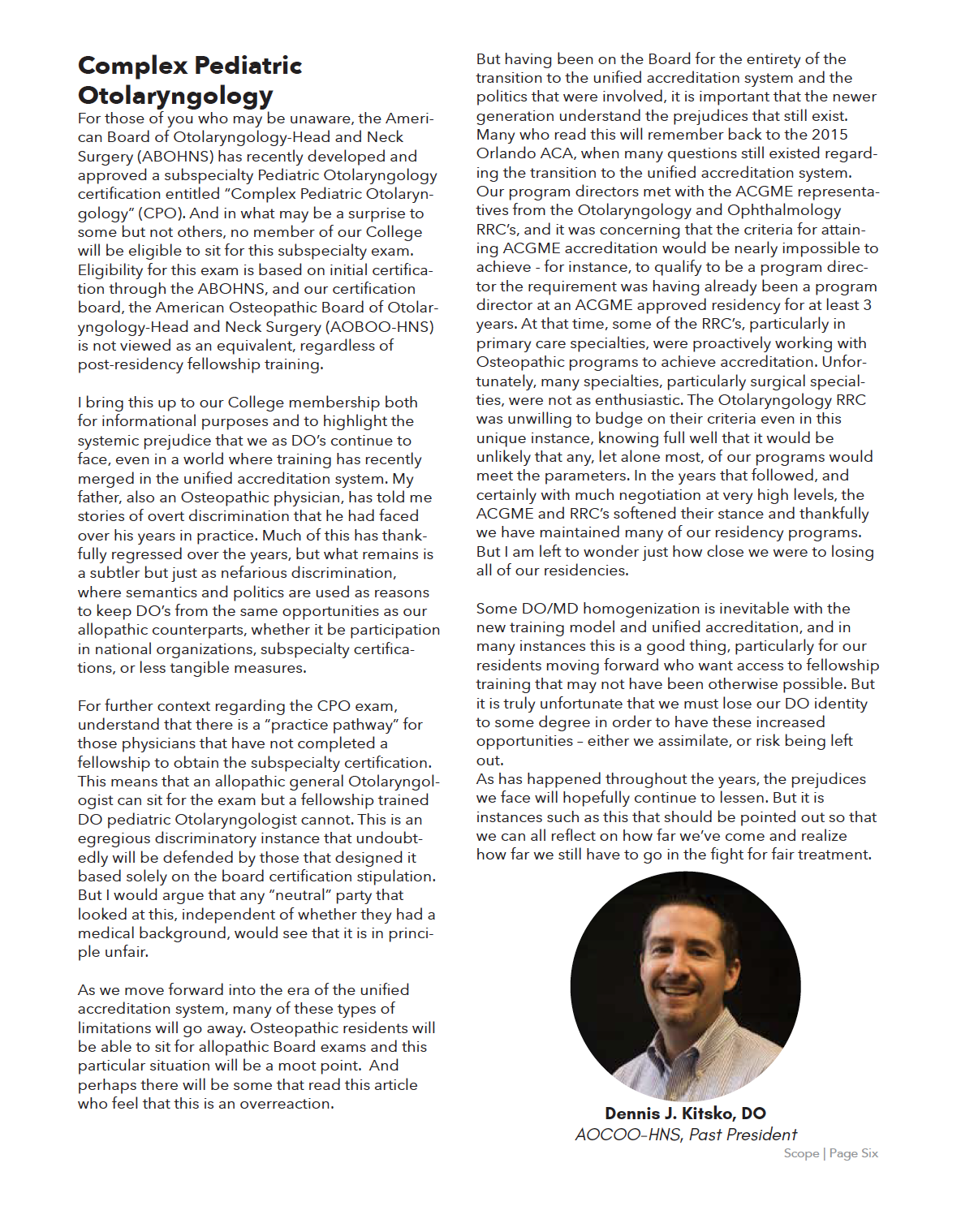Complex Pediatric Otolaryngology

For those of you who may be unaware, the American Board of Otolaryngology-Head and Neck Surgery (ABOHNS) has recently developed and approved a subspecialty Pediatric Otolaryngology certification entitled “Complex Pediatric Otolaryngology” (CPO). And in what may be a surprise to some but not others, no member of our College will be eligible to sit for this subspecialty exam. Eligibility for this exam is based on initial certification through the ABOHNS, and our certification board, the American Osteopathic Board of Otolaryngology- Head and Neck Surgery (AOBOO-HNS) is not viewed as an equivalent, regardless of post-residency fellowship training.
I bring this up to our College membership both for informational purposes and to highlight the systemic prejudice that we as DO’s continue to face, even in a world where training has recently merged in the unified accreditation system. My father, also an Osteopathic physician, has told me stories of overt discrimination that he had faced over his years in practice. Much of this has thankfully regressed over the years, but what remains is a subtler but just as nefarious discrimination, where semantics and politics are used as reasons to keep DO’s from the same opportunities as our allopathic counterparts, whether it be participation in national organizations, subspecialty certifications, or less tangible measures.
For further context regarding the CPO exam, understand that there is a “practice pathway” for those physicians that have not completed a fellowship to obtain the subspecialty certification. This means that an allopathic general Otolaryngologist can sit for the exam but a fellowship trained DO pediatric Otolaryngologist cannot. This is an egregious discriminatory instance that undoubtedly will be defended by those that designed it based solely on the board certification stipulation. But I would argue that any “neutral” party that looked at this, independent of whether they had a medical background, would see that it is in principle unfair.
As we move forward into the era of the unified accreditation system, many of these types of limitations will go away. Osteopathic residents will be able to sit for allopathic Board exams and this particular situation will be a moot point. And perhaps there will be some that read this article who feel that this is an overreaction.
But having been on the Board for the entirety of the transition to the unified accreditation system and the politics that were involved, it is important that the newer generation understand the prejudices that still exist. Many who read this will remember back to the 2015 Orlando ACA, when many questions still existed regarding the transition to the unified accreditation system. Our program directors met with the ACGME representatives from the Otolaryngology and Ophthalmology RRC’s, and it was concerning that the criteria for attaining ACGME accreditation would be nearly impossible to achieve - for instance, to qualify to be a program director the requirement was having already been a program director at an ACGME approved residency for at least 3 years. At that time, some of the RRC’s, particularly in primary care specialties, were proactively working with Osteopathic programs to achieve accreditation. Unfortunately, many specialties, particularly surgical specialties, were not as enthusiastic. The Otolaryngology RRC was unwilling to budge on their criteria even in this unique instance, knowing full well that it would be unlikely that any, let alone most, of our programs would meet the parameters. In the years that followed, and certainly with much negotiation at very high levels, the ACGME and RRC’s softened their stance and thankfully we have maintained many of our residency programs. But I am left to wonder just how close we were to losing all of our residencies.
Some DO/MD homogenization is inevitable with the new training model and unified accreditation, and in many instances this is a good thing, particularly for our residents moving forward who want access to fellowship training that may not have been otherwise possible. But it is truly unfortunate that we must lose our DO identity to some degree in order to have these increased opportunities – either we assimilate, or risk being left out.
As has happened throughout the years, the prejudices we face will hopefully continue to lessen. But it is instances such as this that should be pointed out so that we can all reflect on how far we’ve come and realize how far we still have to go in the fight for fair treatment.
Dennis J. Kitsko, DO AOCOO-HNS, Past President
